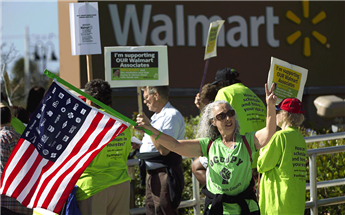Want to Know What $15 An Hour Minimum Wage Means? Ask Wal-Mart
IBDEditorials.com

Wal-Mart employees and union supporters rally for
better pay and benefits outside a store in Boynton
Beach, Fla., on Nov 23, 2012. AP
Labor: Wal-Mart's politically
driven decision to raise its workers' pay is a major
reason for its financial woes. Maybe now Americans
will think about what the same thing would mean if
it were imposed on the entire U.S. economy.
As IBD's
Jed Graham reported Monday, Wal-Mart's recent
earnings warning is due largely to the company's
decision to unilaterally raise its wages.
For the record, we have no problem with wage hikes.
But when it's done for political rather than
economic reasons, it's always a mistake.
It's hard to blame Wal-Mart. In recent years, the
retailing behemoth has been subjected to nonstop
hard-left criticism for its low wages. The criticism
stung.
So earlier this year, the company announced it would
raise its own base wage to $9 an hour in April and
to $10 an hour as of February 2016. Very generous.
But last week, the Benton, Ark., discounter issued
its second warning about profits in two months,
saying that it expects a 6%-13% drop in earnings
next year as a result of its higher costs.
Wal-Mart's shares didn't take it lightly, plunging
10% in just a day — a $21 billion loss for
shareholders.
Contrary to the propaganda of unions and their media
toadies, Wal-Mart's profit margins are razor-thin —
about 3.6% in 2013. Now, due to higher wage costs
and ObamaCare, its margins will shrink below 3%.
It's strange that Wal-Mart's poor results surprised
investors. After all, earlier this year, after its
wage hikes were announced, Wal-Mart quietly revealed
plans to lay off 1,000 workers at its headquarters.
Then, in April, it announced it would close five
stores for "plumbing" problems, idling 2,500 more
workers. No doubt, as the company's margins are
squeezed further, more layoffs will come.
Unfortunately for its critics, Wal-Mart already pays
its workers more than the comparable average for
retail workers, as a 2014 National
Bureau of Economics Research study showed. That
never stops the criticism.
Meanwhile, anti-Wal-Mart activists also ignore the
discount chain's massive economic benefits to the
U.S. economy.
A 2005 study by Global
Insight found WalMart saved American families —
even those who don't shop there — $2,500 a year, or
some $287 billion total.
Even so, Wal-Mart is a test case for what unions and
their "progressive" allies are now trying to foist
on all of us: A job-killing hike in the U.S. minimum
wage to $15 an hour from $7.25. Don't expect a
different outcome. It will kill millions of jobs and
raise minority youth unemployment dramatically.
We've already seen what such big wage hikes have
done to cities such as Seattle, San Francisco and
Oakland. Massive mandated hikes in the minimum wage
have caused businesses to close, killed jobs and
lost many others their long-cherished benefits as
employers scramble to offset sharply higher wages.
A doubling of the U.S. minimum to $15 an hour will
mean the Wal-Mart-ization of America — job losses,
benefit cuts, closed stores and a lower standard of
living for all. But at least the far left will feel
good.

